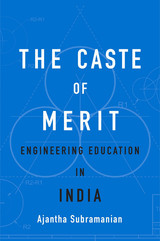
How the language of “merit” makes caste privilege invisible in contemporary India.
Just as Americans least disadvantaged by racism are most likely to endorse their country as post‐racial, Indians who have benefited from their upper-caste affiliation rush to declare their country post‐caste. In The Caste of Merit, Ajantha Subramanian challenges this comfortable assumption by illuminating the controversial relationships among technical education, caste formation, and economic stratification in modern India. Through in-depth study of the elite Indian Institutes of Technology (IITs)—widely seen as symbols of national promise—she reveals the continued workings of upper-caste privilege within the most modern institutions.
Caste has not disappeared in India but instead acquired a disturbing invisibility—at least when it comes to the privileged. Only the lower castes invoke their affiliation in the political arena, to claim resources from the state. The upper castes discard such claims as backward, embarrassing, and unfair to those who have earned their position through hard work and talent. Focusing on a long history of debates surrounding access to engineering education, Subramanian argues that such defenses of merit are themselves expressions of caste privilege. The case of the IITs shows how this ideal of meritocracy serves the reproduction of inequality, ensuring that social stratification remains endemic to contemporary democracies.
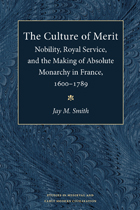
Jay M. Smith argues that the early modern nobility instinctively drew a correlation between the meaning of merit and an image of the "sovereign's gaze." In the early seventeenth century, merit meant the qualities traditionally associated with aristocratic values: generosity, fidelity, and honor. Nobles sought to display those qualities before the appreciative gaze of the king himself. But the expansion of the monarchy forced the routinization of the sovereign's gaze, and Louis XIV began to affirm and reward new qualities--talent and application--besides those thought innately noble.
The contradictions implicit within the absolute monarchy's culture of merit are demonstrated by the eighteenth-century French army, which was dominated by the nobility, but also committed to efficiency and expertise. Smith shows that the army's continuous efforts to encourage and reward "merit" led to a clash of principles. The ever-growing emphasis on talent and discipline led reformers--the great majority of them noble--to attack the most egregious examples of privilege and favoritism in the army. Smith's analysis of the long-term evolution in conceptions of royal service suggests a new explanation for the shift in values signified by the French Revolution. The transition away from the "personal" gaze of the king toward the "public" gaze of the monarchy and nation foretold the triumph of a new culture of merit in which noble birth would have no meaning.
The Culture of Merit will interest historians and other social scientists concerned with issues of aristocratic identity, state formation, professionalization, and the changing political culture of pre-Revolutionary France.
Jay M. Smith is Assistant Professor of History, University of North Carolina, Chapel Hill.
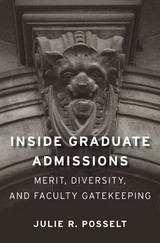
How does graduate admissions work? Who does the system work for, and who falls through its cracks? More people than ever seek graduate degrees, but little has been written about who gets in and why. Drawing on firsthand observations of admission committees and interviews with faculty in 10 top-ranked doctoral programs in the humanities, social sciences, and natural sciences, education professor Julie Posselt pulls back the curtain on a process usually conducted in secret.
“Politicians, judges, journalists, parents and prospective students subject the admissions policies of undergraduate colleges and professional schools to considerable scrutiny, with much public debate over appropriate criteria. But the question of who gets into Ph.D. programs has by comparison escaped much discussion. That may change with the publication of Inside Graduate Admissions…While the departments reviewed in the book remain secret, the general process used by elite departments would now appear to be more open as a result of Posselt’s book.”
—Scott Jaschik, Inside Higher Ed
“Revealing…Provide[s] clear, consistent insights into what admissions committees look for.”
—Beryl Lieff Benderly, Science
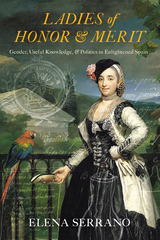
In the late eighteenth century, enlightened politicians and upper-class women in Spain debated the right of women to join one of the country’s most prominent scientific institutions: the Madrid Economic Society of Friends of the Country. Societies such as these, as Elena Serrano describes in her book, were founded on the idea that laypeople could contribute to the advancement of their country by providing “useful knowledge,” and their fellows often referred to themselves as improvers, or friends of the country. After intense debates, the duchess of Benavente, along with nine distinguished ladies, claimed, won, and exercised the right of women to participate in shaping the future of their nation by inaugurating the Junta de Damas de Honor y Mérito, or the Committee of Ladies of Honor and Merit. Ten years later, the Junta established a network of over sixty correspondents extending from Tenerife to Asturias and Austria to Cuba. With this book, Serrano tells the unknown story of how the duchess and her peers—who succeeded in creating the only known female branch among some five hundred patriotic societies in the eighteenth century—shaped Spanish scientific culture. Her study reveals how the Junta, by stressing the value of their feminine nature in their efforts to reform education, rural economy, and the poor, produced and circulated useful knowledge and ultimately crystallized the European improvement movement in Spain within an otherwise all-male context.
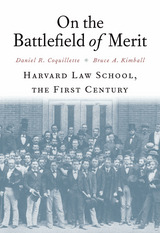
Harvard Law School is the oldest and, arguably, the most influential law school in the nation. U.S. presidents, Supreme Court justices, and foreign heads of state, along with senators, congressional representatives, social critics, civil rights activists, university presidents, state and federal judges, military generals, novelists, spies, Olympians, film and TV producers, CEOs, and one First Lady have graduated from the school since its founding in 1817.
During its first century, Harvard Law School pioneered revolutionary educational ideas, including professional legal education within a university, Socratic questioning and case analysis, and the admission and training of students based on academic merit. But the school struggled to navigate its way through the many political, social, economic, and legal crises of the century, and it earned both scars and plaudits as a result. On the Battlefield of Merit offers a candid, critical, definitive account of a unique legal institution during its first century of influence.
Daniel R. Coquillette and Bruce A. Kimball examine the school’s ties with institutional slavery, its buffeting between Federalists and Republicans, its deep involvement in the Civil War, its reluctance to admit minorities and women, its anti-Catholicism, and its financial missteps at the turn of the twentieth century. On the Battlefield of Merit brings the story of Harvard Law School up to 1909—a time when hard-earned accomplishment led to self-satisfaction and vulnerabilities that would ultimately challenge its position as the leading law school in the nation. A second volume will continue this history through the twentieth century.
READERS
Browse our collection.
PUBLISHERS
See BiblioVault's publisher services.
STUDENT SERVICES
Files for college accessibility offices.
UChicago Accessibility Resources
home | accessibility | search | about | contact us
BiblioVault ® 2001 - 2024
The University of Chicago Press









